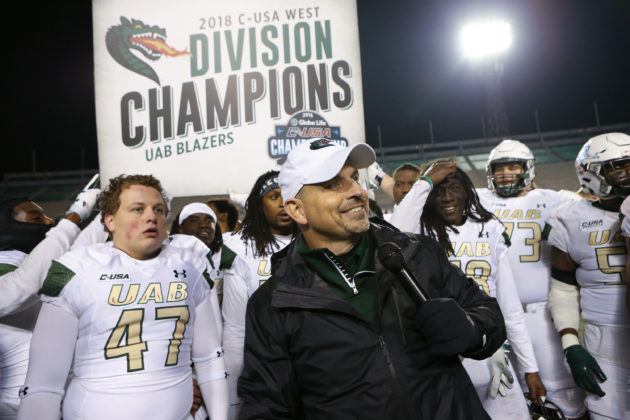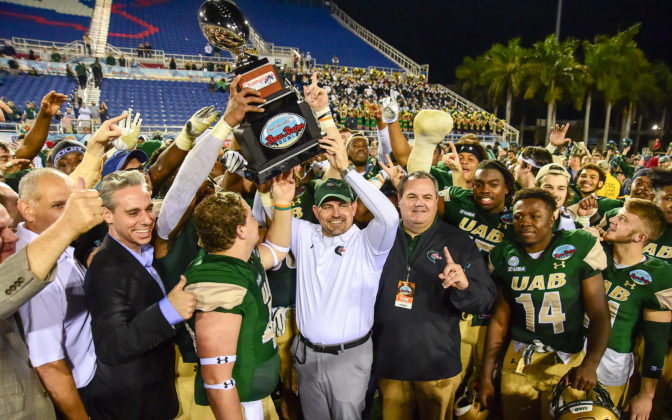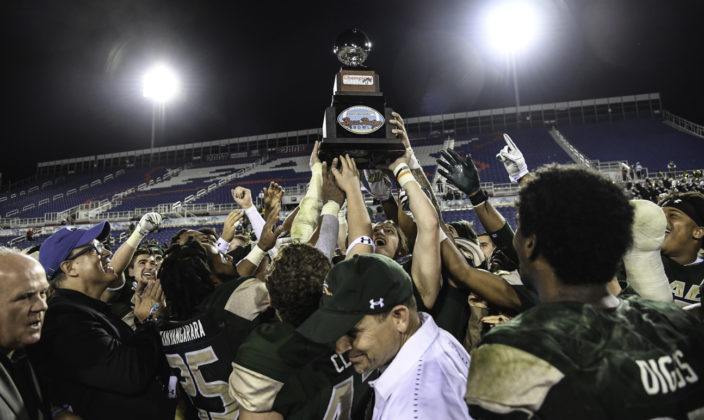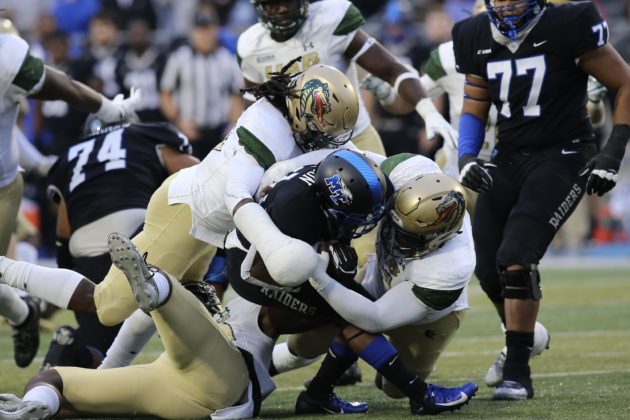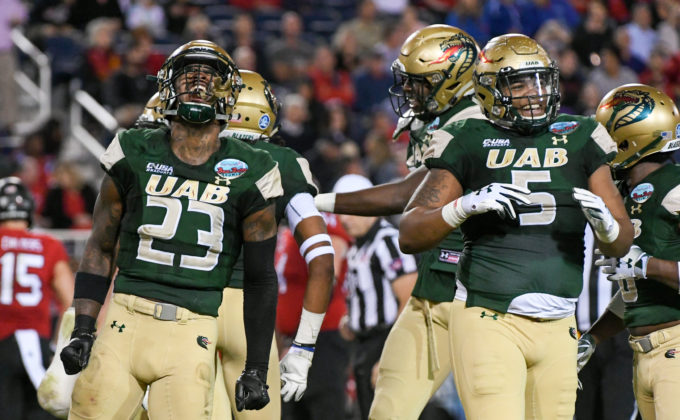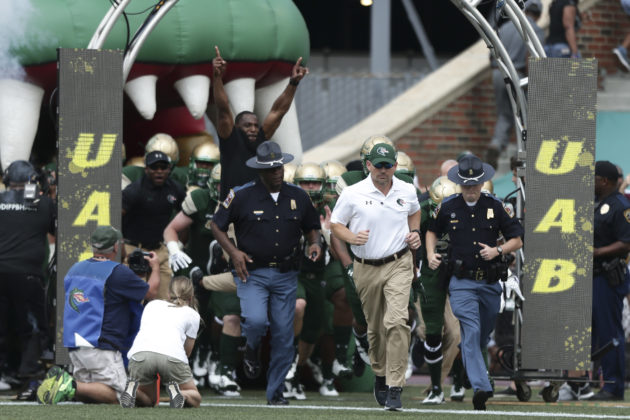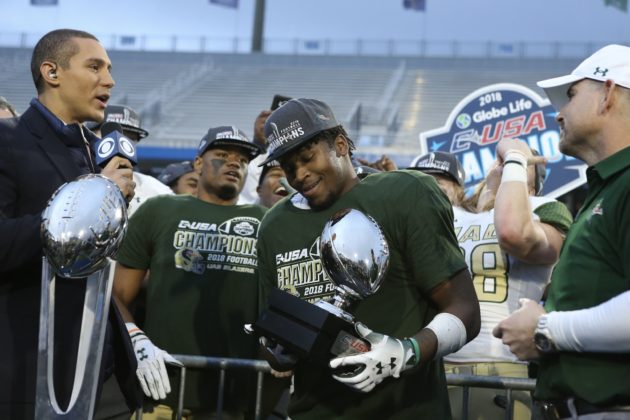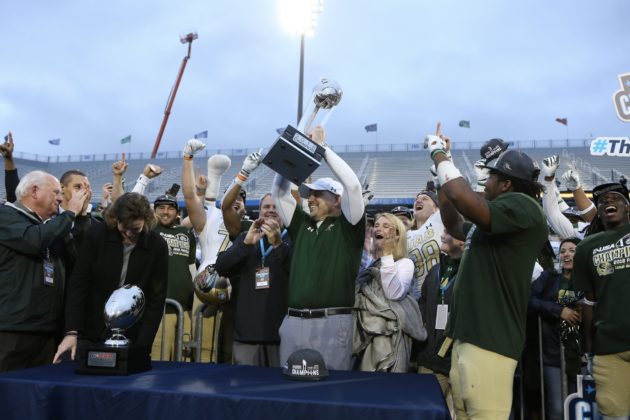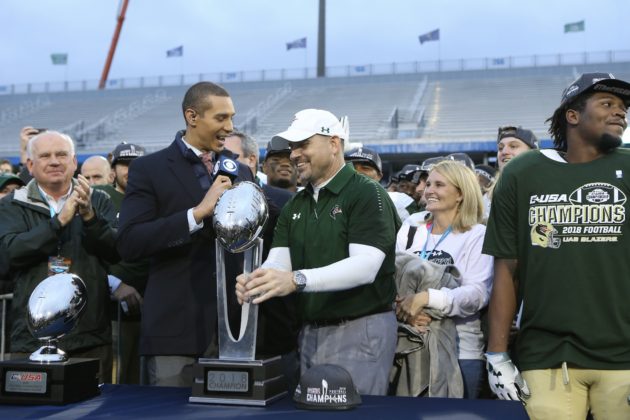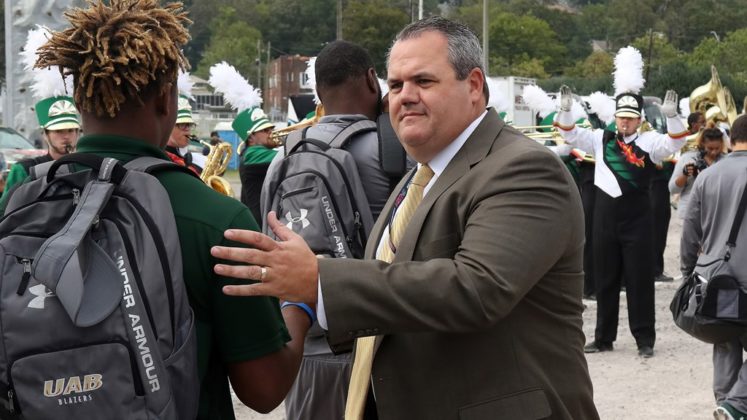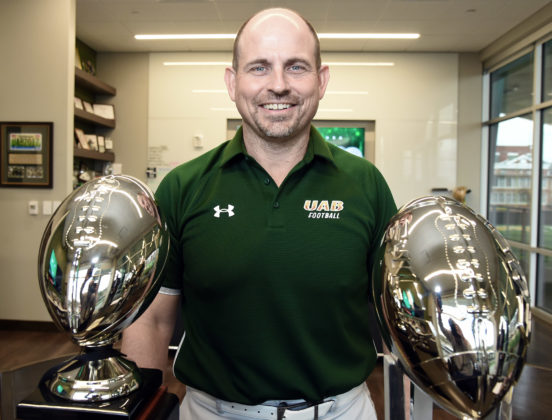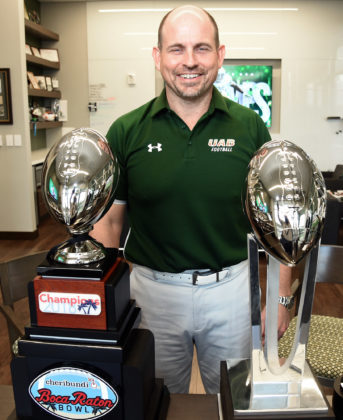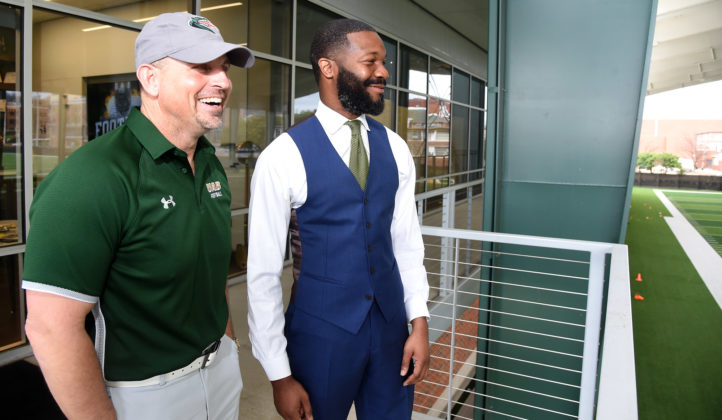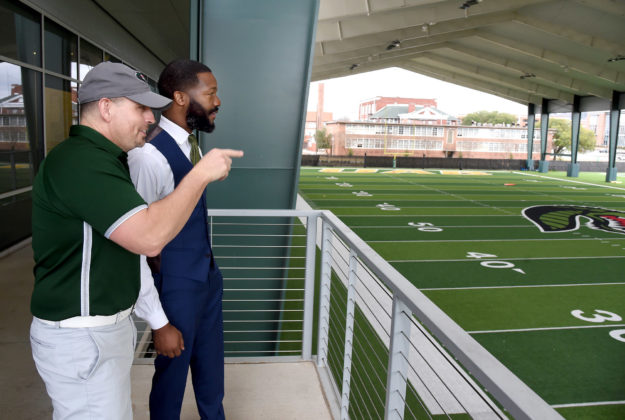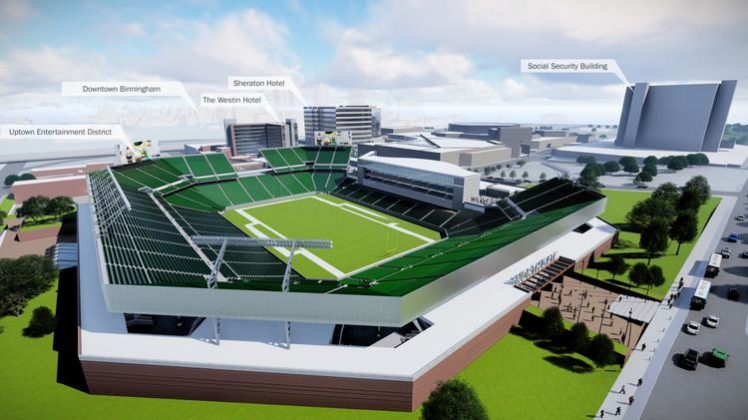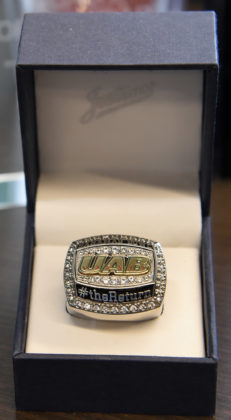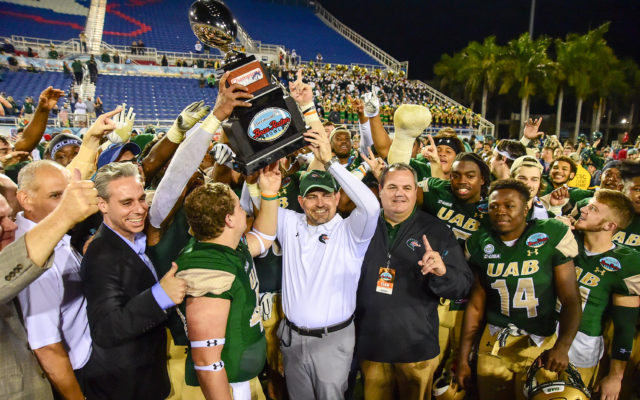
By Barnett Wright
The Birmingham Times
Long before the horn sounded to end the Conference USA (C-USA) football championship game between the Middle Tennessee State University Blue Raiders and the University of Alabama at Birmingham (UAB) Blazers, the young men from Birmingham were winners.
That C-USA title game was the most important, most consequential victory in the history of the UAB football program. But well before that December 2018 game in Murfreesboro, Tenn., the Blazers had accomplished far more than anyone could have imagined. This team and their larger-than-life coach won a city, won the hearts and minds of a community, and would soon win a nation.
“We’re playing for more than ourselves,” UAB Head Football Coach Bill Clark said. “Our team is not just the guys in the locker room. It’s the people who helped them get there. And the people who helped us get there are obvious—it’s our community, this city. They believed in us, and we want to go out and play our best.”
The UAB football program was terminated after the 2014 season and reinstated in June 2015. After a two-season hiatus, in 2017 the team returned to the gridiron and went on to become one of the greatest college football comeback stories in recent history.
This season, the UAB Blazers finished 11-3; captured their first C-USA championship, defeating Middle Tennessee State, and first division title; made their first back-to-back bowl trips; and won their first bowl game. Clark, in addition to winning the prestigious Eddie Robinson National Coach of the Year award, was also named the 2018 Sporting News Coach of the Year. More than that, however, the team united an often-fractured community. They brought together groups and individuals that frequently had been at odds and never would have come together for any other cause.
“What these young men accomplished under the leadership of Coach Clark is simply amazing,” said Birmingham Mayor Randall Woodfin, who announced that a parade to celebrate the football team’s win will take place on January 18.
“UAB already means so much to Birmingham in terms of jobs, economic impact, and the education it provides its students,” he added. “Now, this team has shown the entire nation what Birmingham is all about—resilience, teamwork, and perseverance.”
Resilience
The return of the UAB football team provided a much-needed boost for Birmingham.
“For the football team to not only come back but win a conference championship two years [after returning] and win the bowl game was a shot in the arm for everybody,” said Royal Cup Coffee CEO Emeritus Hatton Smith, who led fundraising efforts for the revived team. “It’s a classic feel-good story. When you lose things and rise up and bring them back, it just makes you feel better and say, ‘If you did this, what’s next?’”
Jack Williams, a longtime UAB supporter and former Alabama state representative, said, “What you saw was a group of young men that had a mantle placed on them by this community. Those young men were commissioned to go out and create a legacy, and I think they’ve done an outstanding job of laying the foundation for other young men to come behind them and build on. These guys realized that they were playing for more than themselves.”
How far has the program rebounded? When the program folded, there were 1,400 season-ticket holders; there are now 14,000. And the success of the team has had a transformative impact on more than just the university.
“UAB football is raising the image of the community,” Williams said. “We’re noted as a community that pulled together and built what many, many people around the United States are calling one of the most incredible stories in college football history. … To some people, it may have just been football, but it’s so much more than that.”
Many say the Blazers are helping to cast Birmingham in a new, more positive light, given the city’s shameful past of race relations and, recently, fragmented governmental relations.
Woodfin said the football team provides momentum that the city can build on: “I think the more people in the nation see UAB in the national spotlight, with a national presence, the more people want to come to the city of Birmingham.”
Teamwork
Never in recent memory, if ever, had the metro area rallied behind a singular issue the way it did for UAB football after the demise of the program.
“We saw dozens of local municipalities pass resolutions urging UAB to reinstate football. I’ve never seen anything, anything, in this community that so many folks got on board with prior to UAB,” Williams said. “We saw the [Jefferson] County Commission pass a resolution of support for UAB. We saw the city of Birmingham pass a resolution of support for UAB. We saw City Council members publicly speak out in favor of UAB football.”
Among those who helped get support from area municipalities was Timothy Alexander, a graduate of Birmingham’s E.B. Erwin High School, who was among the first to tell Clark that he wanted to help bring back football.
Alexander, who had been paralyzed in a car accident in 2006, traveled across the metro area in his wheelchair and became an inspiration for supporters of the team.
Elected officials like former Jefferson County Commissioner David Carrington, who early on announced his backing for a revived team, said, “The Blazers became Birmingham’s team, joining Jefferson County, Railroad Park, Regions Field and Barber Motorsports Park, among others, as tangible symbols of the metro area’s rebirth and resurrection. As such, local economic developers have another success story to share with prospective companies nationally and internationally.”
A sign of teamwork? Business leaders donated to build a state-of-the-art $22.5 million football headquarters and practice facility. The city of Birmingham and Jefferson County pitched in to build a $174 million, 45,000-seat stadium, which is expected to be ready for the 2021 season.
Perseverance
The comeback led to a lot of “good things happening in the city,” said Smith.
“People know it was the citizenry, which included all those disparate groups that came together to make Birmingham look like a … community that can get things done.”
The success of the UAB football team comes at a time when the Birmingham metro area is gaining momentum, something that was very evident throughout 2018.
In May, Birmingham’s Highlands Bar and Grill won the prestigious James Beard Foundation Award as the most outstanding restaurant in America; Highlands pastry chef Dolester Miles took home the award for most outstanding pastry chef. In June, Amazon announced plans to build a $325 million advanced, robotic fulfillment center in Bessemer that will initially employ 1,500 workers; that number could grow to 3,000. In July, Shipt, a Birmingham-based $550 million internet-based delivery service firm, announced plans to expand its Alabama operations by hiring 881 new workers.
In July, Atlanta, Ga.-based information technology service management company DC BLOX said it would build a data center in downtown Birmingham, creating 20 jobs initially with the potential to grow up to $785 million in capital investment and add jobs over the next decade.
Ford Wiles, partner and chief creative officer at Big, an independent full-service public relations agency based in Birmingham, called those successes “proof points.”
“This is emblematic of the story line [of what’s] really happening in Birmingham,” Wiles said. “It’s a different city than you think it is from the outside. [UAB football] is another proof point. Our restaurant winning the [James Beard Award], Shipt bringing 800 jobs here. There is something going on in Birmingham that’s magical, and I think [UAB football] is the next chapter in that story.”
Even Birmingham City Schools (BCS) are showing improvement. Last month, newly released A-F Report Cards published by the Alabama State Department of Education (ALSDE) showed that the system has made significant progress.
“You couldn’t script this any better with what has happened with UAB in the past two years, the success of the football program,” said Birmingham Business Alliance (BBA) President and CEO Brian Hilson. “If you combine all these things—the success of the university and its impact on the community, the emergence of downtown—with the continued success of UAB football, that’s just going to reflect well on Birmingham.”
Economic Impact
After being elected in 2017, Woodfin made a new downtown football stadium one of his many priorities. Asked whether UAB football was in the “back of his mind” when he proposed a new stadium, the mayor said it was in the forefront.
“When I think of professional sports, there is always an investment in facilities because … the players need them. This is their profession, this is their space, this is their place of work, this is where they do their job,” he said. “The players deserve to have facilities that work, [and] … at the exact same time the fan base deserves an experience.
“If the city of Birmingham is going to put down the flag and say we support UAB football, we need to go all the way in … [by building] an actual football stadium that champions UAB and champions Birmingham.”
The outdoor football stadium is part of a project that includes expansion of the Birmingham-Jefferson Convention Complex’s (BJCC) Legacy Arena, which is undergoing a $123 million renovation. The entire downtown area is coming together, according to Hilson.
“There are several key developments downtown, … like Regions Field, Railroad Park, the development of our entertainment district,” he said. “All of this—in addition to the renovations, the continued growth to UAB, and everything else—has a significant economic impact.”
Hilson added, those venues draw people not only from Birmingham “but also from elsewhere in Alabama, out of state, and even internationally, with the World Games coming to Birmingham in 2021.”
Creating Bonds
Not only is the area coming together, but so are people—and they have UAB football to thank.
“I tell people all the time, there is nothing more important than your degree, your faith, … but this is important [because] it brings people together,” said Clark of the return and rebirth of UAB football. “That’s what I love. I love seeing all these people excited and happy, and all the other things it creates, like the stadium. Yes, it’s for us, but all these benefits will be a game-changer for our city. All these people have come together around our program coming back, and now being successful brings people together.”
Wiles, the marketing expert at Big, said UAB football is “another piece of good news coming from a place you keep hearing these great things about.”
“I think that’s going to contribute to everybody, whether it’s the creative community, the business community, the medical community, the educational community. … All these pieces are coming together. … From an outsider’s perspective, [people are saying], ‘Hey, I should look at this place a little bit differently. Look at all of these things that are happening.”
Carrington, who committed part of discretionary funds as a Jefferson County Commissioner to help bring back the UAB football team, said, “The Birmingham metro area without UAB and its more than $7 billion in annual economic impact, would only be a shell of what it currently is. With this in mind, I truly believed that the marginal cost of the football program paled in comparison to the marketing and branding impact that a fair-funded program could have on UAB, as well as the community at large.”
The Future
Hilson said the story of Birmingham is still evolving.
“I believe that as we look back years from now, history will tell us this was a pivotal point in the continued emergence of UAB as a nationally recognized institution,” he said. “Like a lot of universities that are highly successful in areas outside of sports, oftentimes sports, and especially football, give them the opportunity to be seen.”
UAB’s success has quieted some of the naysayers, Carrington said.
“Several years ago, I was told that no one would come downtown to a baseball game. They did. … I was told that no one would eat at [the] Uptown [District]. They did. I was told UAB would never have a football team again. They do. Recently, I was told a stadium would never be built [in Birmingham]. It is. [Former British Prime Minister Sir Winston] Churchill once said, ‘When the eagles are silent, the parrots begin to chatter.’”
“Well,” Carrington said, “the parrots aren’t chattering as much anymore, and the eagles throughout our metro area are talking about something special that is happening in our community.”
–To read about how the Birmingham business community helped to save UAB football, click here.
– To read about what UAB President, Dr. Ray Watts has to say about the football team, click here.

